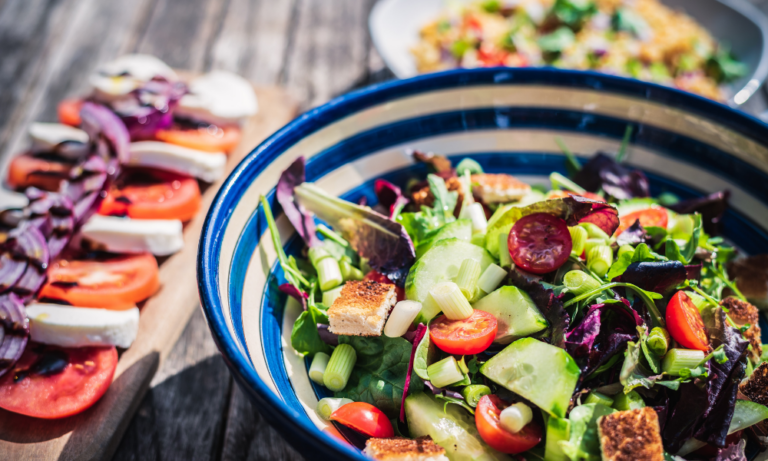Questions and answers: nutrition and cardiovascular health
Foundation, in collaboration with Dr. Martin Juneau, cardiologist and Director of Prevention at the Institute
Home > Blog > Questions and answers: nutrition and cardiovascular health
A healthy diet is the key to a healthy heart. Dr. Martin Juneau, cardiologist and Director of Prevention at the Montreal Heart Institute, answers your questions about nutrition and cardiovascular health.
How does a person’s diet affect their cardiovascular health?
Answer: It should come as no surprise to anyone that a healthy diet is the key to good health, and to cardiovascular health.
The food we eat plays a role on a variety of factors that can lead to heart disease, including:
- cholesterol and blood lipids such as triglycerides
- blood pressure
- weight and waist size
- high glycemic index (diabetes)
- inflammation involved in the development of atherosclerosis and numerous cancers
- a healthy diet strengthens the body’s immune system and its ability to fight infections
What foods should I be integrating into my diet to improve my cardiovascular health?
Answer: There is no single miracle food that will improve your health. The more healthy foods you eat, the better your overall health. Here are a few examples of foods that should be included in your menu.
Vegetables and fruits
To get the most out of the benefits associated with fruits and vegetables, try eating 7 to 10 servings per day. If you love berries, you’ll be thrilled to know they’re high in antioxidants, vitamins, minerals, and fibres and therefore good for your heart. Popular kinds of berries include blueberries, raspberries, and strawberries.
Healthy fats
Who said that fat was bad for your health? An avocado is a source of good fat with numerous benefits for your body. It not only contains good fat but also omega-9 which is known to increase levels of good cholesterol. Try to consume half an avocado once or twice a week to keep your heart healthy!
Wondering which fats to use to prepare your meals? Virgin or extra virgin olive oil is the best for cooking healthy meals. In fact, it’s a pillar of the Mediterranean diet which is renowned for its cardiovascular benefits and its protective effect.
Some types of fatty fish, such as salmon and sardines, are also good for your heart and should be eaten twice a week. They contain high amounts of omega-3 and can lower your blood pressure and increase the amount of good cholesterol. They’re also renowned for their anti-coagulant effect which can help prevent blood clots.
Whole grains
Whole grain foods should be part of your regular diet because they are packed with fibre, protein, and vitamins. An easy way to add them to your diet is to eat whole grain bread instead of regular white bread.
Flaxseed is also a good addition to any diet. With its slightly nutty taste, it stands out from other plant-based options because it’s high in omega-3 and an exceptional source of lignans. It also has antioxidant and anti-inflammatory properties. In fact, recent studies have revealed that flaxseed can have a positive effect on the heart. Add some in your yogurts or smoothies in the morning to start the day off with a healthy meal!
Protein-rich foods
The heart is a muscle and needs protein to keep going. But even though protein is often associated with meat, there are loads of other foods that you can eat to get your fill.
Nuts are a prime example of a protein-rich food that should be added to your diet. They reduce the risks of developing heart disease and researchers have determined they could also reduce cholesterol, blood pressure, and inflammation. Nuts are also an excellent source of omega-3, vitamins, protein, and minerals that can promote cardiovascular health.
Legumes for their part have been rising in popularity in the past few years. They’re delicious in salads, hummus, and soups, to name but a few dishes. Because they’re high in fibre, they’ve become valuable allies in the fight against high cholesterol. They’re also rich in potassium, magnesium, minerals, and can help normalize blood pressure.
Which foods should I avoid to keep my heart healthy?
Answer: You should avoid, or at least cut down, on foods high in salt, added sugar, or bad fats if you want to maintain your cardiovascular health. A good way to avoid these foods is to stay away from hyper-processed foods and enjoy home cooking.
Try to cut down on:
- Foods high in sugar, such as sugary beverages and juices as well as desserts.
- Foods high in salt: processed meat and foods as well as fast food. These often contain the daily recommended intake of sodium in one single meal.
- Fats: This category includes fried foods, fatty meats, and hyper-processed foods.
- Alcohol: You should drink alcohol only in moderation. Women should limit their alcohol intake to one drink per day and men to two drinks per day.
Can the Mediterranean diet really improve my cardiovascular health?
Answer: The Mediterranean diet contains lots of vegetables, fruits, whole grains, legumes, olive oil, poultry, and fish. It is rich in antioxidants and can have a positive impact on your heart.
Is red wine really healthy for a heart?
Answer: Yes and no. It’s all about moderation. As mentioned above, red wine can be beneficial if you don’t go over your daily limit (one glass of wine per day for women and two for men). And you shouldn’t drink every day.
For more information on how your diet can affect your cardiovascular health, the Montreal Heart Institute’s Prevention watch, piloted by Dr. Juneau and his team, has plenty of practical information for you.
Do you want to help patients and support prevention?
donate today








